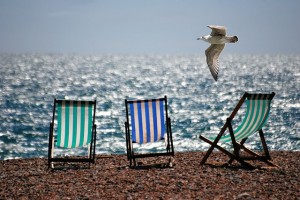 It’s a beautiful day, the sun is shinning and it’s time to have some “fun in the sun”. You pack the family in the car and head to the beach. You have sand toys, beach towels, snacks, drinks and sunblock. You’re ready to enjoy the day right? Well, not exactly. To ensure that your day in the sun is a fun filled day instead of an evening spent in the emergency room, there are a few simple steps you can take to survive the summer heat.
It’s a beautiful day, the sun is shinning and it’s time to have some “fun in the sun”. You pack the family in the car and head to the beach. You have sand toys, beach towels, snacks, drinks and sunblock. You’re ready to enjoy the day right? Well, not exactly. To ensure that your day in the sun is a fun filled day instead of an evening spent in the emergency room, there are a few simple steps you can take to survive the summer heat.
Drink plenty of water
The best defense against dehydration is prevention. In hot weather, drink enough to quench your thirst. The average adult needs eight 8-oz glasses of water a day – more if you are in the heat. If you are feeling thirsty, tired, dizzy or have headache, you may already be on the road to dehydration. Take frequent water breaks and drink even if you don’t feel thirsty. Stick to water because pop or alcohol actually dehydrates you.
Dress for the weather
When outside, wear lightweight clothing made of natural fabrics and a well-ventilated hat. Use sunblock of at least 15 SPF on any skin that is exposed and make sure to reapply as directed. Wear sunglasses that block 99-100% of UV radiation. And wear a hat to protect your neck, ears, forehead, nose and scalp.
Avoid spending time outside during the middle of the day
Spend your time outside either early or late in the day when it is cooler. Take regular breaks in shady areas.
Eat light
Replace heavy or hot meals with lighter, cold refreshing foods.
Think cool!
Take a cool shower or apply a cold compress to your pulse points. Spend time indoors in front of a fan or in an air-conditioned space to cool down.
Summer heat puts you and your family at risk for heat exhaustion or heat stroke.
Heat Exhaustion occurs when the body is not able to sweat enough to cool itself. Some symptoms of heat exhaustion include:
- Dizzoness
- Blurry Vision
- Body temperature of 101 Degrees
- Having difficulty speaking
Heat Stroke is the result of untreated heat exhaustion. Some symptoms of heat stroke include:
- Unawareness of heat and thirst
- Body temperature rises rapidly above 101 Degrees
- Loss of consciousness
- Seizure
If you think you or a family member is suffering from heat exhaustion or heat stroke take the steps necessary to help cool the person down. If necessary seek medical attention at your local urgent care facility or emergency room. Also, most health insurance plans have a discounted copay or co-insurance for visiting an urgent care facility instead of an emergency room.
Whether you’re swimming, attending a ball game or just having a day of fun in the back yard, the summer heat can be a threat to your health. But don’t fret, if you are cautious and follow some simple safety tips you can easily survive the summer heat.
If you found this information helpful, please share.